Since the Academy Awards were first televised in 1953, viewers have tuned in hoping to see someone trip, slip, strip, or crash the party. And sometimes it happens — or even worse! Here are some of Oscar’s most famous follies.
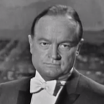 1962: Comedian BOB HOPE is hosting the Oscars from the Santa Monica Civic Center.
1962: Comedian BOB HOPE is hosting the Oscars from the Santa Monica Civic Center.
As the award for cinematography is about to be announced by actress Shelley Winters, a strange man suddenly rushes the podium and grabs the mike. Calling himself Stan Berman, he declares: “Ladies and gentlemen, I’m the world’s greatest gatecrasher and I just came here to present Bob Hope with his 1938 trophy.” Handing a miniature statuette to actress Winters, he says “This is for Bob” and dashes off.
The “1938” reference may have been to Hope’s film The Big Broadcast of 1938, which introduced the song “Thanks for the Memory.” Hope didn’t win an Oscar, but the song did, and it became the comedian’s signature tune.
Returning to the podium later, Bob Hope quips: “Who needs Price Waterhouse? All we need is a doorman.”
(Video image: Oscars.org via YouTube)
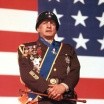 1970: Veteran actor GEORGE C. SCOTT is Oscar-nominated for his terrific performance as General George Patton in the World War II epic Patton.
1970: Veteran actor GEORGE C. SCOTT is Oscar-nominated for his terrific performance as General George Patton in the World War II epic Patton.
But! Calling the Oscars “a two-hour meat parade,” Scott announces that he will avoid the awards ceremony altogether. On the big night, presenter Goldie Hawn rips open the best actor envelope and squeals, “Oh my God! The winner is George C. Scott!” True to his word, Scott is not there — he’s home at his farm in New York, watching a hockey game on TV.
He’s the first actor ever to refuse an Oscar.
Patton’s producer, Frank McCarthy, accepts the statue on George C. Scott’s behalf, and keeps his speech short and sweet: “In voting this award, I think that the Academy has distinguished itself. I think it has done itself a great deal of good, and shown what a good organization it is, by recognizing and honoring so generously a fine performance by a great actor.”
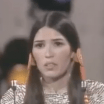 1973: “Hello. My name is Sacheen Littlefeather. I’m Apache and… I’m representing MARLON BRANDO this evening.”
1973: “Hello. My name is Sacheen Littlefeather. I’m Apache and… I’m representing MARLON BRANDO this evening.”
So says a young woman in Indian garb who takes the microphone after Marlon Brando wins the best actor award for The Godfather. Brando, not to be outdone by George C. Scott, has sent Littlefeather to protest the treatment of Native Americans in the movies.
The audience reacts with confusion and scattered boos. Actor Clint Eastwood, announcing the Best Picture award moments later, says “I don’t know if I should present this award on behalf of all the cowboys shot in John Ford westerns over the years.”
After the ceremony, attendees argue about whether Sacheen Littlefeather was really a Native American or just an actress. Years later she responds on her own website:
“Contrary to misinformation which has been published on the internet, Sacheen Littlefeather is indeed of true Native American Indian descent. Sacheen was born Marie Cruz in Salinas, California. Her mother is French-German-Dutch, and her father was from the White Mountain Apache and Yaqui tribes from Arizona. ‘Cruz’ is her father’s recognized tribe name. Sacheen took the name ‘Sacheen Littlefeather’ after high school to reflect her natural heritage. She is not a ‘Mexican actress’ as Roger Ebert incorrectly reported.”
(Video image: Oscars.org via YouTube)
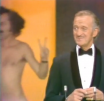 1974: Actor DAVID NIVEN is about to present the Oscar for best picture, when the audience erupts in shrieks of laughter. 33-year-old Robert Opal is streaking naked, on live TV, behind Niven and across the stage of the Dorothy Chandler Pavillion. Opal flashes a peace sign as he passes the cameras, and NBC cuts away to avoid full frontal nudity.
1974: Actor DAVID NIVEN is about to present the Oscar for best picture, when the audience erupts in shrieks of laughter. 33-year-old Robert Opal is streaking naked, on live TV, behind Niven and across the stage of the Dorothy Chandler Pavillion. Opal flashes a peace sign as he passes the cameras, and NBC cuts away to avoid full frontal nudity.
As the laughter dies down, Niven blithely tells the crowd, “Well, ladies and gentlemen, that was almost bound to happen. But isn’t it fascinating… to think that probably the only laugh that man will ever get in his life is by stripping off and showing his shortcomings.”
(Video image: Oscar.org via YouTube)
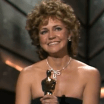 1984: SALLY FIELD has won the best actress Oscar before, in 1978 for Norma Rae.
1984: SALLY FIELD has won the best actress Oscar before, in 1978 for Norma Rae.
But after Robert Duvall hands her the 1984 Oscar for Places in the Heart, Field turns to the crowd and starts a gush-a-thon: “I wanted more than anything to have your respect. The first time I didn’t feel it, but this time I feel it and I can’t deny the fact you like me. Right now, you really like me!”
“You really like me!” becomes an instant comic catchphrase. The next year at the Oscars, Field, a good sport, presents the best actor award by saying, “Let’s see which one you like, you really, really like.”
(Video image: Oscar.org via YouTube)
 1989: A famously bizarre opening number, which includes cameos by Vincent Price and Roy Rogers, ends with hunky actor ROB LOWE jiving and singing “Proud Mary” with an actress dressed up as Snow White.
1989: A famously bizarre opening number, which includes cameos by Vincent Price and Roy Rogers, ends with hunky actor ROB LOWE jiving and singing “Proud Mary” with an actress dressed up as Snow White.
The nutty concept is a ghastly flop. In the following days, Lowe is ribbed mercilessly for bad singing, and the Academy is ribbed mercilessly for bad taste.
How bad is it? So bad that the The New York Times reports in April, “In a letter to the Academy signed by 17 Hollywood luminaries, including [Julie] Andrews, [Paul] Newman, Gregory Peck, Billy Wilder and Sidney Lumet, the 61st Oscar show was called ‘an embarrassment to both the Academy and the entire motion picture industry.”
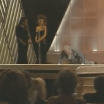 1991: 73-year-old JACK PALANCE is named best supporting actor for City Slickers and goes cheerfully berzerk onstage.Demonstrating his rugged virility, Palance suddenly hits the floor and starts doing one-armed pushups, with presenter Whoopi Goldberg looking on and laughing. Returning to the podium, Palance makes a few off-color comments and rambles: “As far as two-handed pushups are concerned, you can do that all night.”Oscar host Billy Crystal (his co-star in City Slickers) turns the incident into a running joke, telling the audience later in the show, “Jack Palance just bungee-jumped off the Hollywood sign.” In true Hollywood fashion, the incident jump-starts Palance’s career, and he remains a Hollywood favorite until his death in 2006.
1991: 73-year-old JACK PALANCE is named best supporting actor for City Slickers and goes cheerfully berzerk onstage.Demonstrating his rugged virility, Palance suddenly hits the floor and starts doing one-armed pushups, with presenter Whoopi Goldberg looking on and laughing. Returning to the podium, Palance makes a few off-color comments and rambles: “As far as two-handed pushups are concerned, you can do that all night.”Oscar host Billy Crystal (his co-star in City Slickers) turns the incident into a running joke, telling the audience later in the show, “Jack Palance just bungee-jumped off the Hollywood sign.” In true Hollywood fashion, the incident jump-starts Palance’s career, and he remains a Hollywood favorite until his death in 2006.
 2017: Chaos at the Oscars! Hollywood legends FAYE DUNAWAY and WARREN BEATTY are onstage to name the winner of best picture; after Beatty pauses in puzzlement and shows Dunaway the envelope, Dunaway announces “La La Land!” Minutes later, as the producers of the musical are onstage giving their thank-you speeches, producers interrupt them to say that a grotesque mistake has been made: the real winner is Moonlight. An uproar ensues as the Moonlight team takes the stage, the La La Land people depart, and millions of viewers go nuts.
2017: Chaos at the Oscars! Hollywood legends FAYE DUNAWAY and WARREN BEATTY are onstage to name the winner of best picture; after Beatty pauses in puzzlement and shows Dunaway the envelope, Dunaway announces “La La Land!” Minutes later, as the producers of the musical are onstage giving their thank-you speeches, producers interrupt them to say that a grotesque mistake has been made: the real winner is Moonlight. An uproar ensues as the Moonlight team takes the stage, the La La Land people depart, and millions of viewers go nuts.
What happened? Beatty tells Oscar host Jimmy Kimmel on live TV, “I opened the envelope and it said ‘Emma Stone, La La Land.’ That’s why I looked at Faye, and at you. I wasn’t trying to be funny.”
Representatives of PriceWaterhouseCooper, the accounting firm that handles the voting, take the blame in a statement later that night: “We sincerely apologize to Moonlight, La La Land, Warren Beatty, Faye Dunaway, and the Oscar viewers for the error that was made during the award announcement for best picture,The presenters had mistakenly been given the wrong category envelope and when discovered, was immediately corrected.”
“Immediately” corrected… but only after creating the greatest Oscar-night gaffe of all time.
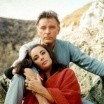 Which Hollywood stars have been married seven times or more?
Which Hollywood stars have been married seven times or more?
Find out in SERIAL SPOUSES >>
